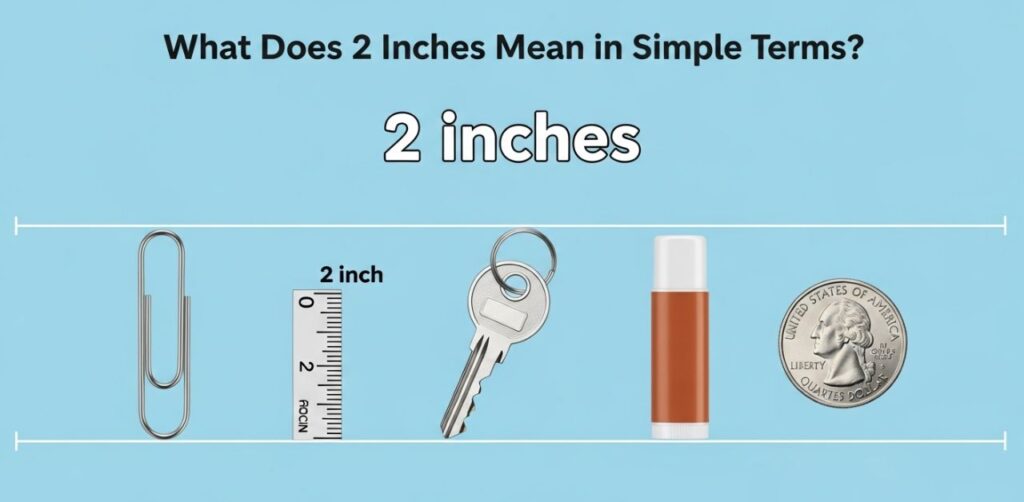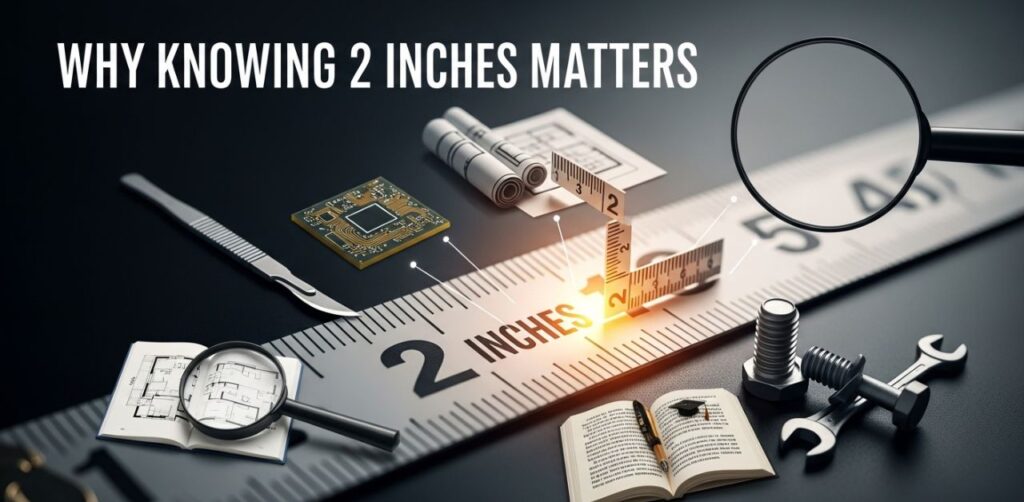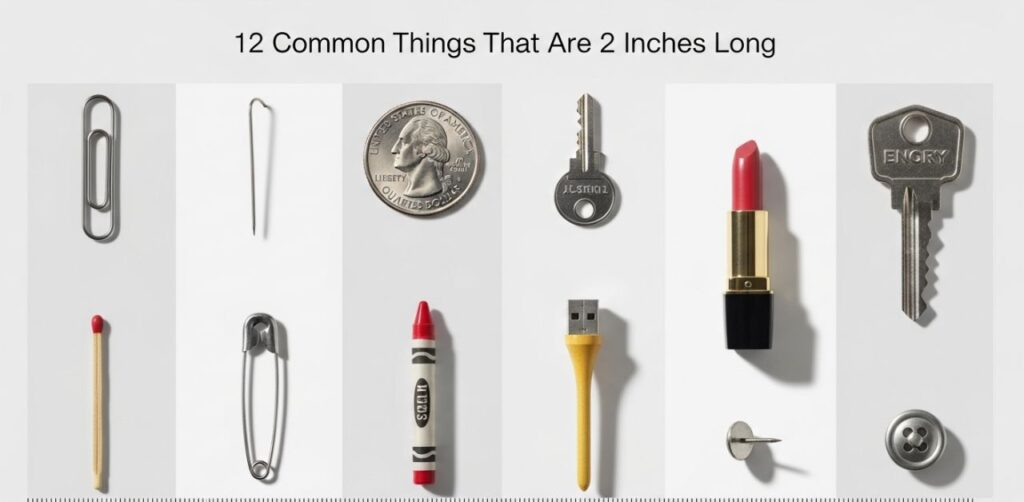Have you ever wondered how long is 2 inches really? While it sounds like a small measurement, knowing things that are 2 inches long can be surprisingly useful. Whether you’re doing a DIY craft, comparing objects, or trying to visualize 2 inches without a ruler, having real-world examples helps bring measurements to life.
This guide explores everyday items that are 2 inches long, along with simple ways to measure 2 inches without tools. You’ll learn how to spot common objects that are 2 inches, discover practical measurement examples, and even understand 2-inch conversions in centimeters and millimeters.
What Does 2 Inches Mean in Simple Terms?

Simply put, 2 inches equals about 5.08 centimeters (cm) or 50.8 millimeters (mm). It’s a short length that often appears in small household objects and compact design components.
If you imagine a standard paper clip, it’s roughly 1.75 to 2 inches long, giving you a quick visual reference. Many people find it easier to visualize 2 inches when comparing it to familiar items.
Key facts:
- 2 inches in cm = 5.08 cm
- 2 inches in mm = 50.8 mm
- It’s about the width of an adult thumb or the diameter of a large coin.
Understanding 2 inches helps you make accurate estimates during DIY projects, crafts, or when buying parts that require precise measurements.
Why Knowing 2 Inches Matters

You might think 2 inches is too small to matter—but it shows up everywhere in daily life! Knowing objects that measure 2 inches can:
- Help with DIY measurement hacks when you don’t have a ruler.
- Improve your estimation skills for crafting, repairs, or shopping online.
- Support educational learning for kids studying imperial to metric conversions.
Being able to visualize 2 inches helps you better understand product sizes, compact designs, and even artistic layouts.
12 Common Things That Are 2 Inches Long
Let’s explore some everyday items that are 2 inches long. These practical measurement examples will help you recognize 2 inches instantly.
1. AA Battery
A standard AA battery is about 2 inches long, making it a perfect reference for small object measurements. It’s one of the easiest ways to estimate short lengths when crafting or measuring small components.
2. Golf Tee
A golf tee typically measures around 2 inches. It’s a great comparison item if you’re working outdoors or in sports design.
3. Eraser
Most rectangular erasers used in school or offices are about 2 inches in length—a simple and accessible size reference.
4. Paper Clip
A large paper clip is roughly 2 inches long, which makes it a handy measuring guide during office tasks or quick craft setups.
5. Matchstick
A wooden matchstick is almost 2 inches long, helping you visualize small lengths when you don’t have a ruler nearby.
6. Coin Diameter (Quarter Coin)
A U.S. quarter coin measures about 1 inch across, so two coins side-by-side roughly equal 2 inches. This is a great trick for visual size comparison.
7. Golf Ball Diameter
A golf ball measures approximately 1.68 inches, slightly under 2—but close enough to visualize objects that measure around 2 inches.
8. Lego Brick (2×2 block)
A 2×2 LEGO brick is close to 2 inches wide, which is a fun and visual way to teach kids about measurements.
9. Soda Can Diameter
The top diameter of a soda can is nearly 2 inches, giving you a circular example for 2-inch measurement examples.
10. Popsicle Stick Width
A popsicle stick is usually about 2 inches wide, making it useful in DIY measurement guides or craft-based learning.
11. Snooker Ball Diameter
A snooker ball has a diameter of about 2.05 inches, another excellent way to visualize 2 inches in real life.
12. Bank Card Height
A bank card or credit card is about 2 inches tall and 3.37 inches wide—a practical reference item found in every wallet.
How to Visualize 2 Inches Without a Ruler

If you don’t have measuring tools, here are easy ways to estimate 2 inches using common items:
- Use your thumb – The width of most adult thumbs is close to 1 inch, so two thumbs together equal about 2 inches.
- Use coins – Two quarters side-by-side roughly measure 2 inches.
- Use a battery – A AA battery equals roughly 2 inches in length.
These DIY measurement hacks make it easy to estimate small lengths anywhere, anytime.
Quick Conversion Table for 2 Inches
| Measurement Type | Equivalent Value |
| Inches | 2 in |
| Centimeters (cm) | 5.08 cm |
| Millimeters (mm) | 50.8 mm |
| Meters | 0.0508 m |
This simple ruler measurement guide helps convert 2 inches to metric units quickly.
Practical Uses for a 2-Inch Measurement
You might need a 2-inch size when:
- Designing crafts or models where small dimensions matter.
- Ordering parts online like screws, knobs, or clips.
- Comparing component sizes in electronics or DIY projects.
- Teaching kids about imperial and metric systems.
Learning how to measure 2 inches accurately improves both precision and confidence in small-scale tasks.
FAQ: Things That Are 2 Inches Long
What are some everyday items that are 2 inches long?
Common examples include a AA battery, eraser, paper clip, and golf tee.
How long is 2 inches in centimeters?
2 inches equals 5.08 cm.
How can I measure 2 inches without a ruler?
Use two quarters side-by-side, a AA battery, or two thumb widths as a quick reference.
What does 2 inches look like visually?
It’s about the width of two adult fingers or the height of a credit card.
Why is knowing 2 inches important?
It helps in DIY projects, design, and product comparisons, especially when you lack measuring tools.
Conclusion
Knowing things that are 2 inches long helps you make better visual and practical size judgments in everyday life. Whether you’re doing crafts, comparing parts, or just curious, these real-world examples of 2-inch items make understanding small measurements simple and fun.
Remember—understanding what 2 inches looks like can make a big difference in both learning and creativity.Explore more measurement guides to continue improving your everyday measuring skills!